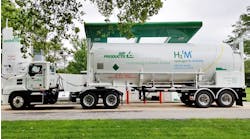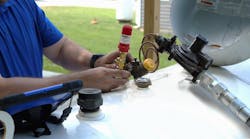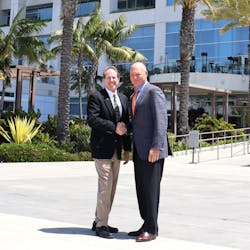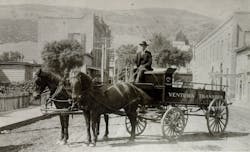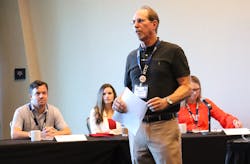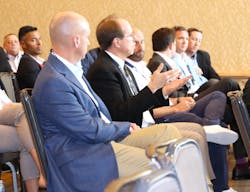Randall J. “Randy” Clifford obsesses over the tiniest details.
Fastidiousness is a trait he acquired from his father, Jack L. Clifford, who purchased Ventura Transfer Company—which was founded in 1869 in Ventura County, California—from prominent resident Charlie Orr in 1957, and it’s one of the keys to the carrier’s resiliency, along with equipment innovation, industry adaptation, and debt-free operation.
That detail-oriented approach also benefited National Tank Truck Carriers during Randy’s term as the association’s 75th chairman of the board.
“Randy Clifford has been an absolutely amazing and thoughtful chairman,” said Ryan Streblow, NTTC president and CEO. “I personally have not had the opportunity to sit with somebody who is as detail oriented as he as, while also having the ability to implement his ideas. He has done a great job. That was extremely evident during our strategic planning meeting last July, which was his first meeting after taking on the chairmanship role at the 2022 Annual Conference. He really helped us put some structure around this organization, and advance the growth of our membership, and the initiatives outlined in our strategic priorities.”
Randy, 68, the chairman and CEO at Ventura, has helped advance his company’s interests since succeeding his father as president in 1987. Jack was born in 1916, so he was a teenager during the Great Depression, an experience that solidified his resolve to survive by avoiding debt collectors.
That’s why Ventura today is one of the oldest continuously operated trucking companies in the country. “Dad always concentrated on the details—and doing the job right,” Randy relayed. “And he was determined to stay out of debt. He always felt that it was better to collect interest than to pay it. I tried to expand on that with my six children, teaching them it’s smart to stay debt-free, because if you stay out of debt, you stay out of trouble.
“This country has had many ups and downs in the last 150 years, including the Great Depression, two world wars, several smaller wars, and many recessions in between. And by staying out of debt, focusing on what we do well, and staying relevant, we’ve remained in business, so those are the tenets we’ve stuck with. And that’s why our company has continued to evolve. We don’t do a lot of the things we used to do in the same way, but we’re still doing a lot of what we always did—which is hauling cargo to and from the rails and ports. It’s just that the commodities are different now, and the equipment is very different.”
Ventura ferried freight to the beach with horses and wagons 153 years ago. It started transferring goods and passengers to trains when the Southern Pacific Railroad arrived in the late 1880s and hauled crude oil in the early 1900s. Jack had a propane-hauling company before buying Ventura’s tank truck business, which he then steered toward plastic pellets and specialty chemicals over the next 15 years. He also established a transloading business in the 1960s, and his sons started Ventura’s ISO tank container operation in the 1990s.
Today, the carrier provides chemical, dry bulk, and food-grade transportation, transloading, and container storage for five Western states and border towns in Baja California and Sonora, Mexico, with a fleet of 18 company-owned power units, 20 independent contractors, 49 tank trailers, 52 specially designed drop-center chassis—which enable flexible, cost-effective operations—and 20 20-ft. ISO tanks. Ventura has 110 employees and six locations, including Phoenix, Arizona; Reno, Nevada; El Centro, California; and three in the Los Angeles area. The Long Beach headquarters, served by Union Pacific Railroad as a transload site, includes a truck terminal, tank wash, container storage depot, and warehouse; and Ventura also has major transload facilities in Wilmington and Commerce.
Randy, who joined Ventura in 1980, oversees the expansive operation, all while remaining heavily involved in industry organizations. He joined the California Trucking Association board of directors in the late 1980s and rose to president in 2002. He also served on the boards of American Trucking Associations, chairing its safety policy committee from 2011 to 2013, and the Intermodal Motor Carrier Conference. He’s been on NTTC’s board of directors since 2013 and the Transload Distribution Association of North America’s board since 2010.
Before taking on the next challenge, the 2022-23 NTTC chairman spoke with Bulk Transporter for our annual version of a State of the Industry address.
Questions and answers are edited for space and clarity.
Bulk Transporter: You’ve jokingly been dubbed the “stealth” chairman, because you “snuck” into the job, and those who thought you were quiet are finding out you’re quite funny. How will you remember your chairmanship?
Randy Clifford: “It came and went quickly. Working with industry leaders, here and in the other associations with which I’ve been involved, has been a great experience. I’ve learned something from everybody—and I’m a sponge. There are members of this executive committee who are exceptional people, and exceptional leaders. There is a distinction between the two, and when you put them together, you have someone special. I’ve really appreciated being around them, learning from them, listening to them, and becoming friends. So, the greatest opportunity chairing National Tank Truck Carriers afforded me was getting to know the leaders in our industry and learn from them. That’s been fun. The same is true with the California Trucking Association, with which I’m still very much involved. I was mentored by some great people when I was young, and gained a lot from that, so I hope to do the same for others.”
BT: How do you view the current state of the tank truck industry?
RC: “There’s a lot of consolidation. Many of the seasoned family or individually owned businesses are disappearing rapidly. I was sitting with four past ATA chairmen about six months ago, and every one of them had sold their business in the last year or two, and I was thinking, ‘Wow, what am I missing here?’ So we’re seeing a lot of consolidation in the industry, and the big carriers are getting bigger. I hope there’s still room for new guys to rise up and fill those voids, but I don’t know. It’ll be interesting to see how that evolves.
“Is the industry still in good shape? Well, it’s changing. Of course, California is leading the way with emissions controls, and now greenhouse gasses. For 30 years, it was all about emissions controls, and the particulates—the smog and soot diesel generates. Now they’ve changed the game, and it’s all about greenhouse gasses, and regulators aren’t paying attention to the gains we made in traditional emissions controls. That’s leading us to forced electrification. So now our industry is grappling with not only, how are we going to power our equipment, but what are we going to haul? Half of NTTC’s members are petroleum haulers. So those folks are really having to think about that, and some of them are starting to haul chemicals. They’re stepping into my space. So, chemical haulers are going to be put under more pressure as energy haulers redirect resources to the chemical space. But the trucking industry is filled with creative and adaptable people. As one door closes, we find others to open.”
RC: “No. We started looking at it, but they cost twice as much, and there’s no place to charge. We’re considering getting a yard goat, but we still have to come up with a charging station, and that could cost a lot of money, with no guarantee the utility will supply the necessary power. That’s hard to justify from a cost perspective. So, we’re laying back, watching what’s happening, and paying close attention. And hopefully, some of these costs will come down, or CARB [the California Air Resources Board] will extend the deadlines.
“At our Executive Forum [in February], we talked about the hydrogen option, and to me, that makes the most sense. We also talked about diesel hybrids. Hybrid cars work well. They don’t have the same charging concerns, because if the battery runs out, the gasoline engine takes over. Why not develop diesel hybrids, at least as a transitory technology until the infrastructure catches up? So, we asked someone from Cummins, what about diesel hybrids? And he said they have them. They use them in Europe very effectively, but the policymakers don’t want them here, and again, that’s our politicians saying they want diesel to die. They want it gone. But if we could continue to use diesel in a hybrid way, that could extend its useful life.”
BT: As for consolidation, private equity has changed the game. Is there still a place for family-owned businesses like yours?
RC: “Well, the founders of a lot of sole proprietorships are selling out. And that’s a legitimate strategy. My brothers and I discussed it probably 20 years ago, and we decided we had three choices. We could milk the business to the end, shutter it when we’re done, then get as much out of it as we could and be done. That’s one strategy. Another one is to run the business like we’re prepared to sell. That’s a whole different strategy with different choices, but it’s also a legitimate strategy. The third strategy is to keep it as a legacy business, keep it alive, keep it thriving; and then hope the next generation is interested, train them, and try to pass it on. That, by far, is the hardest thing to do. Much harder than the other two options. So my brothers and I could sell today for tens of millions of dollars, whatever the number is, pay our taxes, and sit on a beach in Hawaii the rest of our lives, and never have a thing to worry about; or we could continue with the business, remain active, and compete, but we’ll never hit the jackpot. And that’s the decision we made. We all live modestly, as our parents did. We’re comfortable, but we don’t spend a lot on ourselves. We put the money back into the business.
“So, we’ve made some big decisions. In the last couple of years, we made structural changes, we modified the articles of incorporation, and we changed the bylaws, creating two classes of stock. We enlarged the board, adding an outside person to give us more objectivity and expertise, and we’re meeting regularly to go over business. So, it’s more formalized and professionalized than in the last 30 years, all with the intent of setting things up better for future generations. And by changing the classes of stock, and beginning to distribute it to the next generation, we’re giving them a sense of actual ownership, and not just, like my dad always said, ‘One day, this will all be yours.’ I heard that a dozen times in my life. They have a chance for it to be theirs now, and to feel a sense of ownership and participate financially in the benefits. And we’re hoping that will interest more of them.
“Also, we’re hoping those who aren’t participating in the business will still be supportive of their cousins, who are operating the business, because now they have a shared stake. And we also see that as an opportunity for the family. There are 14 people in the third generation, and they’re married and having children of their own, and we’re hoping it’s not just Christmas, Thanksgiving, or Easter when the family gets together. So, this becomes another way to bind the family together. We’ll meet once a year in the summer and we’ll have the annual shareholder meetings, to celebrate the business, and also make a family gathering out of it, to celebrate the family.
“We’re hoping that helps us. But who knows? A company is only as good as its leadership, and the economy. As my dad said, he was successful because of a lot of hard work—and luck. You can’t ignore that part.”
BT: You’ve been active with several transportation industry associations over the years. Why is it important to stay engaged?
RC: “There are different reasons to join organizations, and for me, getting involved with NTTC was different than getting involved with CTA. CTA provides a great learning experience, and and effective voice in Sacramento, and ATA does the same in D.C. I’ve gotten very involved on the policy side at ATA, with some of the association’s leading committees, but with some of them, I’m sort of the token small carrier in the room. I fill that role. It’s like the old saying goes, if you’re not at the table, you’re on the menu, so you really need to keep an eye on things. NTTC is different. It’s more of a collegial group of professionals working together to advance industry causes. Yes, we’re competitors. But we pull together as advocates for our unique industry. We’ve got the best drivers, and the most difficult circumstances to work with, so if you really want to develop your tank truck business, being a part of NTTC will help you.”
RC: “One area that’s been part of my efforts—for which I hope we’ve laid the groundwork and we’ll see even more results in future years—is membership growth. We hired Benton Landers [as director of sales], and he came on board about the same time I became chairman, so now we’re at full staff. That’s the job Ryan originally was hired to do … so I was pleased he found a replacement for himself, and I challenged him. I said, ‘You’ve got to turn [Landers] loose and motivate him to keep going.’ So, I worked with Ryan on a sales reporting mechanism. I like seeing things on one page, and this basically shows trends with new and lost members, and the monetary affect of gaining or losing them, in terms of dues. Now we can keep score. Are we ahead? Are we behind? Are we trending in the right direction? It gives the Executive Committee visibility they didn’t have.
“Another area I’ve been working on behind the scenes is our bylaws. We made changes a few years ago, and [Groendyke President and CEO] Greg Hodgen and I worked hard to update and improve them, but we need to do more. So, I’m going to at least try to get the ball rolling on that before my term ends, and then leave it up to the next chairman to finish it. Or maybe he’ll put me in charge. I don’t know. The committee structure has been pretty ad hoc, so we’ve been formalizing that; and there are some standing committees in the bylaws, but the segment committees, like energy, chemical and food grade, aren’t formalized in any way. So, I’ve been working with Ryan on that, and ultimately that probably will end up as changes to the bylaws, giving us better building blocks for the association going forward, because there will be clarity as to how you move through the association, the committees we have, and how to support the association’s mission.”
BT: Do you have any advice for the incoming chairman?
RC: “Not really. I’d just say let’s build on the things [past chairman] Rob Sandlin and I got started, with workforce development, the branding campaign, and the sales oversight. I suggest he looks at the things we’ve gotten started and build on them. And we’re around to help with that. We’re certainly going to do everything we can. And then he can add his imprint, and what he sees differently, to the equation.”
BT: How do you want others to remember your time as 2022-23 NTTC chairman?
RC: “I would love for NTTC leadership and membership to remember Ventura Transfer Company as an old company with new ideas, and for them to remember me as somebody who was there for the association, and willing to spend the time and effort to make it better. And I don’t plan on going anywhere, so I’ll be around to help any way I can. I’d also like to think Ventura Transfer will be here another 150 years and continue to defy the odds. And they’ll have to drag me out, because I am so committed to creating a legacy business, passing it to the next generation, and doing everything I can to make sure that its survives. I just hope the next generation is up for it.” BT
